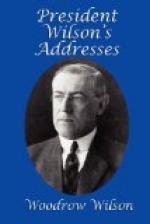And now for the way his imagination works and clothes itself in language. The quality of his mind is poetic, and his style is highly figurative. There have been very few professors, lecturing on abstruse subjects, such as economics, jurisprudence, and politics, who have dared to give so free a rein to an instinct frankly artistic. In the early days of his career, Mr. Wilson was invited to follow two courses which were supposed to be inconsistent with each other. The so-called “scientific” method, much admired at that time even when applied to subjects in which philosophic insight or a sense for beauty are the proper guides, was being urged upon the rising generation of scholars. Perhaps the Johns Hopkins University was the center of this impulse in America; at least it was thought to be, though the source was almost wholly German. If he had had to be a dry-as-dust in order to be a writer on politics and history, Mr. Wilson would have preferred to turn his attention to biography and literary criticism. But he promptly resolved to disregard the warnings of pedants and to be a man of letters though a professor of history and politics. I well remember the irritation, sometimes amused and sometimes angry, with which he used to speak of those who were persuaded that scholarship was in some way contaminated by the touch of imagination or philosophy. He at least would run the risk. And so he set himself to work cultivating the graces of style no less assiduously than the exactness of science. There is a distinct filiation in his diction, by which, from Stevenson to Lamb and from Lamb to Sir Thomas Browne, one can trace it back to the quaint old prose writers of the seventeenth century. I remember his calling my attention, in 1890, or thereabouts, to the delightful stylistic qualities of those worthies. Many of his colors are from their ink-horns, in which the pigments were of deep and varied hues. When he is sententious and didactic he seems to have caught something of Emerson’s manner. And indeed there is in all his writings a flavor of optimism and a slightly dogmatic, even when thoroughly gentle and persuasive, tone which he has in common with the New England sage.




